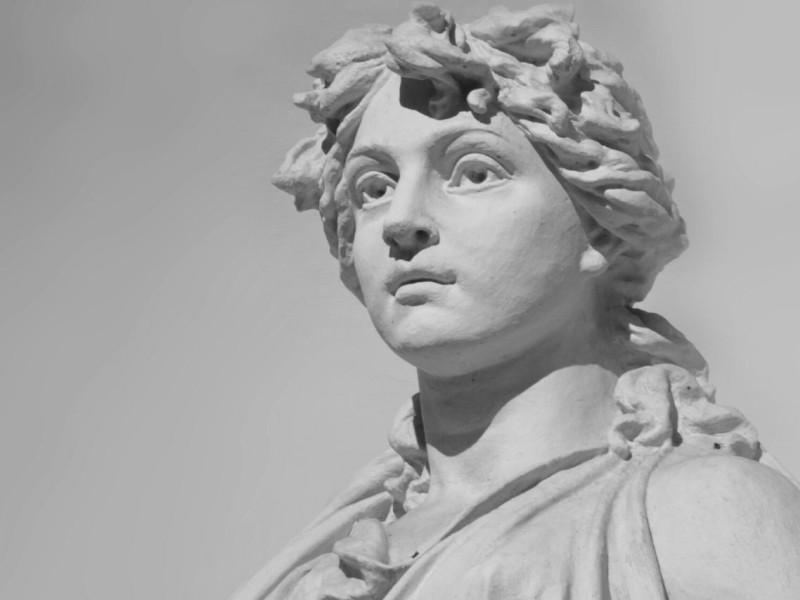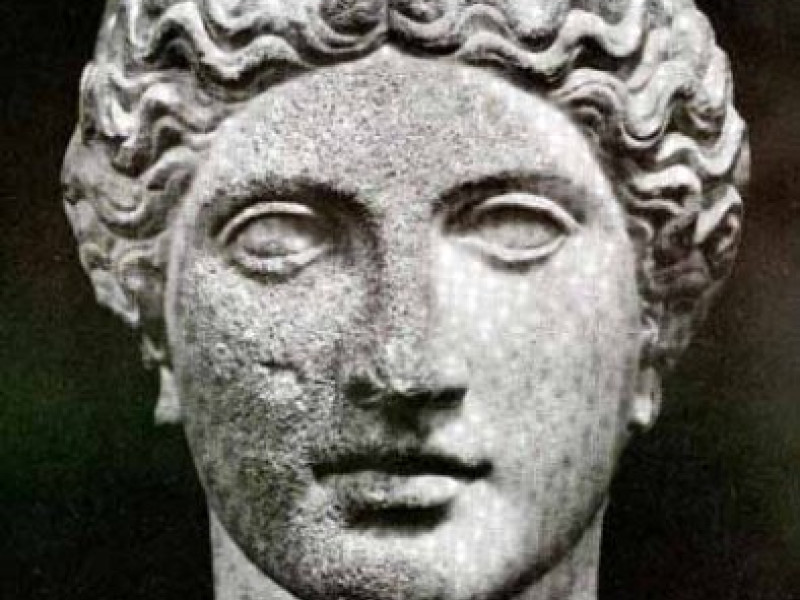Aphrodite (Venus)
The goddess of love and beauty. She was identified with the Roman goddess Venus. There are two versions of her birth.
According to Homer, Aphrodite was known as the daughter of Zeus and Dione. Dione was either a Titaness, the daughter of Uranus and Gaea, or an Oceanid, the daughter of Oceanus and Tethys. But according to Hesiod, she was an earlier deity than the Olympians.
When the Titan Cronus castrated his father (Uranus) and flung his genitals into the sea near the island of Cythera, the blood and semen caused foam to gather and float across the sea to the island of Cyprus. For this reason, Aphrodite was often called Cythereia, and Cyprian or Cypris, after her two holy islands. There, Aphrodite rose out of the sea from the foam (hence her name came from the word aphros, which means "foam"). She had experienced no infancy or childhood. She was born a grown, young woman. See Creation about Aphrodite's birth.
Aphrodite was married to Hephaestus but had numerous affairs with gods and mortals. The most notorious of these affairs was her long dalliance with Ares.
To Ares, she was said to have become the mother of Anteros (Passion), Eros (Love), Deimus (Fear), Phobus (Panic) and Harmonia, wife of Cadmus of Thebes. Only later myths say that Eros was her son. According to Hesiod, Eros came intto existence with Gaea and Tartarus, from the void known as Chaos.
Hephaestus knew that Aphrodite was having a long term affair with Ares, so he decided to punish them. During his apparent absence, Hephaestus trapped the guilty pair in the bedchamber that he shared with the love goddess. Ares and Aphrodite hung suspended in a golden net, without a stitch of clothes upon them. Hephaestus invited the other Olympians to witness the humiliated adulterers. They were the source of amusement and ridicule. Hephaestus wanted to leave them trapped in his net but he reluctantly released them on the insistence of Poseidon, who admired the beauty of Aphrodite and paid reparations in return for her and her lover's freedom. Aphrodite rewarded Poseidon by sleeping with the sea god, whence she became the mother of Eryx. See Love and War Bound.
However, in Apollonius of Rhodes' Argonautica, Eryx's father was Butes, an Argonaut. Butes was the hero who jumped overboard from the Argo when he heard the song of the Sirens. Aphrodite saved him by spiriting the hero away to Sicily, where Butes founded the city of Lilybaeum on the west coast. There, Butes became her lover and she bore Eryx. Eryx was the boxer who later challenged strangers to fight with him, until Heracles killed him.
Hermes also admired Aphrodite's beauty but she wasn't interested in a sexual relationship with the herald god. Hermes was so depressed with longing that Zeus decided to intervene on behalf of his son. Zeus sent an eagle that stole Aphrodite's favourite pair of sandals. Aphrodite had to retrieve the sandals from Hermes. So Aphrodite surrendered to Hermes' lust and became the mother of a son named Hermaphroditus.
Through the wine god Dionysus, Aphrodite was the mother of Priapus (Priapos), the god of fertility.
She had several mortal lovers. The most famous was Adonis, son of Cinyras and his own daughter Myrrha (Smyrna), according to Ovid. However, according to Apollodorus, Adonis was the son of King Theias of Assyria and his own daughter Smyrna. Whichever parents Adonis belonged to, he was conceived through incest, caused by Aphrodite. Hesiod said that Adonis was the son of Phoenix and Alphesiboia.
According to Apollodorus, Aphrodite punished Smyrna (Myrrha) for failing to honour her. The goddess made Smyrna fall in love with her own father. She secretly shared her father's bed for twelve nights before Theias discovered the forbidden sin he had unwittingly committed.
Now in Ovid's tale, it was Cinyras who refused to worship Aphrodite and the goddess made his own daughter fall madly in love with him. Myrrha (Smyrna) got her father drunk for twelve nights and slept with him. Upon discovering that Myrrha was pregnant with their incestuous child, Cinyras tried to kill her.
In either version, the father chased his daughter with a sword, intending to kill her. The daughter prayed to the gods to save her. The gods turned her into a myrrha tree (smyrna). The father killed himself in shame.
Some months later, Adonis was born when the tree split open. Aphrodite found the infant so beautiful that she had Persephone bring the child up for her. The child grew so beautiful that both goddesses fell in love with him. Aphrodite had no choice but to share Adonis' love with Persephone. So a third of a year was spent on the surface with Aphrodite and a third in the Underworld with Persephone. The other third, Adonis was free to spend how he wished.
Adonis became a great hunter and spent much of his free time with Aphrodite. Adonis was killed by a wild boar. According to Apollodorus, Artemis sent the boar. Some say that the wild boar was Ares himself. Aphrodite's immortal paramour became jealous of the youth. Aphrodite's grieving for Adonis caused flowers to bloom from his blood.
One of her mortal sons was the Dardanian hero Aeneas by her lover Anchises, king of Dardania. Her affair with Anchises was recorded in one of the Homeric Hymns. Anchises was crippled by a thunderbolt from Zeus when he boasted and revealed that he had made love to the goddess. Aphrodite supported the Trojans during the war, not only because Paris had awarded the golden apple to her as the fairest, but also because Aeneas was an ally of the Trojans. When she tried to rescue her wounded son, Diomedes wounded her and drove Aphrodite off the battlefield; the rash hero harshly rebuked the goddess that the battlefield was no place for her. Apollo had to save Aeneas. Aphrodite would later punish Diomedes when he returned home. He would find that his wife had taken a lover, who banished him from Argos.
Aphrodite would punish anyone who spurned her or refused to recognise her. Hippolytus, son of the hero Theseus worshipped Artemis, but refused to have anything to do with Aphrodite. Aphrodite caused his stepmother Phaedra, daughter of King Minos, to fall in love with him. Phaedra committed suicide, writing a false letter to say that Hippolytus had raped her. Theseus cursed and banished his son. Because of the curse, Hippolytus was mortally wounded when his chariot crashed. Athena revealed to the remorseful father that Hippolytus was innocent.
She was also jealous of anyone who might surpass her in beauty. In the Roman tale, as Venus, Aphrodite wanted to make Psyche marry a monster, but her own son Cupid (Eros) fell in love with her. See Cupid and Psyche in the Tales of Lovers.
Love can be kind as it can be cruel. There were great rewards for being her followers. She rewarded one faithful worshipper, Pygmalion, who fell in love with a statue he created. Aphrodite gave the statue life, with living flesh and blood. Pygmalion married this woman, Galatea.
Her epithets were Acidalia, Anadyomene ("born to the sea"), Cyprian, Cypris, Cythereia, Eriboea (Periboea), Erycina, Euploios ("fair voyage"), Paphia (sexual love), Pelagia, and Pontia.
Her favourite haunts were Cyprus and Cythera. Aphrodite's favourite animals were the dove, sparrow, swallow, swan and turtle. Her attendants were Eros, the Graces, and Peitho, goddess of persuasion.
The Greeks identified her with the Middle Eastern Astarte and the Egyptian Hathor. She may also be identified with the Sumerian Inanna or the Babylonian Ishtar.
Related Information
Name
Aphrodite, Ἀφροδίτη – "Foam-born" (Greek).
Venus (Roman).
Turan (Etruscan).
Sources
Homeric Hymns.
The Iliad and the Odyssey were written by Homer.
Theogony and Works and Days were written by Hesiod.
Catalogues of Women and Shield of Heracles were possibly written by Hesiod.
The Cypria from the Epic Cycle.
Library and Epitome were written by Apollodorus.
Metamorphoses was written by Ovid.
Fabulae and Poetica Astronomica were written by Hyginus.
Hippolytus was written by Euripides.
Argonautica was written by Apollonius.
The Aeneid was written by Virgil.
The Golden Ass was written by Apuleius.
There are too many other references to Aphrodite, to be listed here.
Related Articles
See also Venus.
Zeus, Dione, Uranus, Hephaestus, Ares, Eros.
Aeneas, Adonis, Myrrha (Smyrna), Hippolytus, Hermaphroditus.
Creation, Trojan War, Judgment of Paris.
Love and War Bound.
Facts and Figures: Astronomy.
By Jimmy Joe








